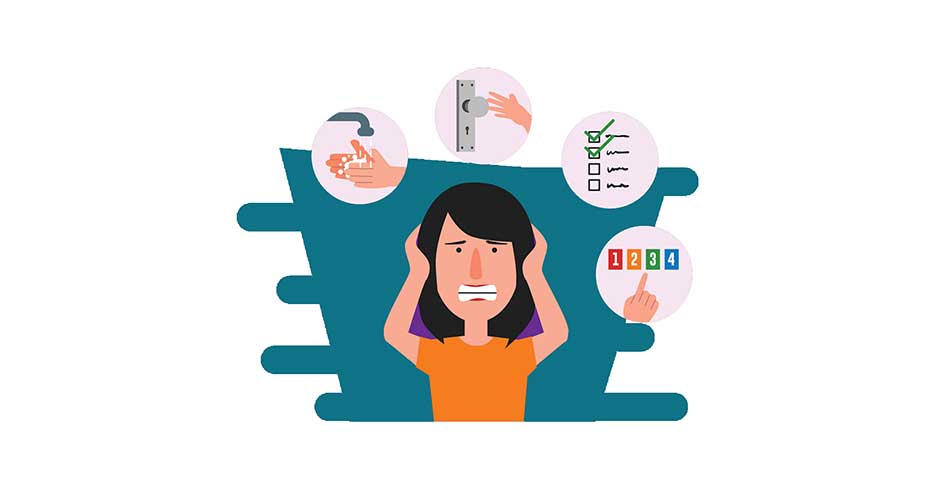Salt therapy – All you need to know
- 24 Feb - 01 Mar, 2024

Obsessive-compulsive disorder (OCD) features a pattern of unreasonable thoughts and fears (obsessions) that lead you to do repetitive behaviours (compulsions). These obsessions and compulsions interfere with daily activities and cause significant distress. You may try to ignore or stop your obsessions, but that only increases your distress and anxiety. Ultimately, you feel driven to perform compulsive acts to try to ease your stress. Despite efforts to ignore or get rid of bothersome thoughts or urges, they keep coming back. This leads to more ritualistic behaviour — the vicious cycle of OCD.
It often centers around certain themes — for example, a fear of getting contaminated by germs. To ease your contamination fears, you may compulsively wash your hands until they're sore and chapped. Though medication and therapy are the main ways to treat this lifelong condition, self-care is a secret weapon with plenty of side benefits.
The only thing more important than eating healthy food is eating it regularly. When you're hungry, your blood sugar drops. This can make you cranky or tired. Start with a daily breakfast, and try to eat small meals more often instead of big meals at lunch and dinner. Go for: Nuts and seeds, which are packed with healthy nutrients, protein like eggs, beans, and meat, which fuel you up slowly to keep you in better balance, complex carbs like fruits, veggies, and whole grains, which help keep your blood sugar levels steady. Steer clear of caffeine, the stimulant in tea, coffee, soda, and energy drinks. It can kick up your anxiety levels a few notches.
Anxiety can make it hard to sleep. But sleep is important for good mental health. Instead of expecting to lie down and drift off to dreamland, create a sleep routine that sets your body up for success. Swap the time you spend looking at screens for 10 minutes of relaxing music or a warm bath. Dim noise and lighting and adjust the temperature in your bedroom so you go to sleep, and stay asleep all night.
When you feel anxious, your body releases a hormone called cortisol. It's helpful in small doses but harmful at high levels. Regular exercise keeps your cortisol levels in check and benefits everything from your bones and organs to the numbers on your scale.
It may be common sense, but it's important to take the right dose at the right time. If you forget to take it, or decide to skip a dose, it could set off your symptoms. Talk to your doctor if side effects are an issue, or before you take anything new, including over-the-counter medicine and vitamins.
Don't hold it all in. Help is as close as your phone or computer. Sometimes the simple act of saying out loud what you're thinking can lower anxiety and give you some perspective. In addition to your doctor, find a therapist, OCD coach, or support group to connect you with people who understand.
Your body can't relax if it doesn't know how. Relaxation techniques like yoga, meditation, taking a walk in nature, or drawing a picture teach your body how it feels to be calm. Try a few to find what works best for you, and spend 30 minutes a day on it.
Learning how to live with OCD takes time. Like any other goal, you’ll have successes and setbacks. Yes, it's important to work on your OCD, but it's just as important to step back and cheer the big and small progress you make along the way.

The type of behavioural therapy shown to be most effective for OCD is known as Exposure and Response Prevention (E&RP). E&RP consists of gradually confronting your fearful thoughts and situations while resisting the performing of compulsions. The goal is to stay with whatever makes you anxious so that you will develop a tolerance for the thought or the situation, and learn that, if you take no protective measures, nothing at all will happen.
Good Cognitive/Behavioural treatment should aim to give you the tools necessary to manage your symptoms effectively. As therapy progresses, the responsibility for directing your treatment should gradually shift from your therapist to you. Whereas the therapist may start out by giving you assignments designed to help you face and overcome your fears, you should eventually learn to spot difficult situations on your own and give yourself challenging homework to do. This will then be a model for how you will need to handle things throughout your life.

COMMENTS